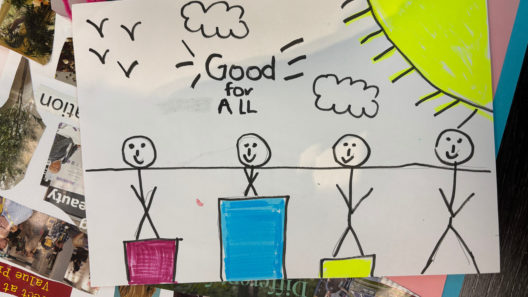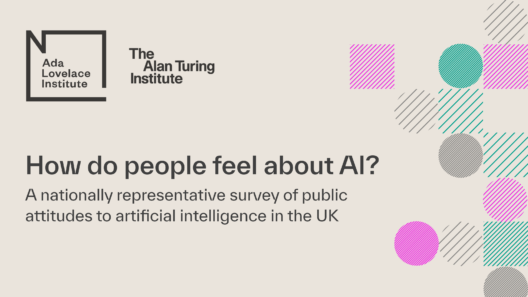Public voices in AI
Exploring how to represent public voices in AI research, development and policy

Project background
A central aspect of responsible AI governance and deployment is ensuring that public hopes, concerns and experiences are accounted for. Yet public voice is often missing from conversations about AI.
Currently, AI technologies are being deployed and developed, often by organisations who say they want to benefit society. But this benefit is often poorly defined, which makes it hard to understand how and who it will benefit. It also tends to assume that the technology will provide positive answers, and does not consider the type of society people want to live in before the technology arrives.
The Ada Lovelace Institute is collaborating with the Digital Good Network, The Alan Turing Institute, Elgon Social Research and University College London on a 12-month, UKRI-funded project, Public Voices in AI. This will explore how to represent public voices in AI research, development and policy, and the value of understanding public views and experiences of AI.
Ada’s contributions to the programme are to provide evidence and develop examples of good practice in quantitative and qualitative research.
How do people feel about AI?
A nationally representative survey of British people’s attitudes to AI technologies and their governance, following up on our 2023 collaboration with the Alan Turing Institute, How do people feel about AI?
AI and the ‘public good’
A qualitative, community-level research project, designed to understand what people across the UK think about AI and the ‘public good’.
The project is designed to enable people to share their priorities and expectations for what a current and future ‘good’ community and society looks like, and to explore AI’s role in preventing or enabling these visions.
We are working with Community Researchers in three different areas of the UK (Belfast, Southampton, and the Borough of Lambeth in London) to help us reach people in communities who aren’t normally asked about what they think, or who may be minoritised or excluded because of their identity or life circumstances.
The Community Researchers are working collaboratively with Ada researchers to help explore what happens when we begin the conversation about AI from the perspectives and priorities of people in different communities across the UK.
This work is trialling a new way of doing research at the Ada Lovelace Institute, which hope will lead to further research that centres the voices of people and society in relation to AI technologies.
In addition, the programme will support participatory projects with people from groups of society who are negatively affected by AI, or underrepresented in AI research, development and policy.
Project aims
The project will run from April 2024 to March 2025. By providing new evidence on UK-wide public attitudes towards AI technologies and their impact on people, this work will inform the work of people throughout AI ecosystem, from policymakers to industry, ensuring it is aligned with expectations, values, hopes and concerns of people, including those experiencing and affected by technologies.
We will also develop tools and resources to further support public involvement in AI policymaking and development in equitable and inclusive ways.
Project publications

Making good
Insights on AI and public good from diverse UK communities

How do people feel about AI? (2025)
Wave two of a nationally representative survey of UK attitudes to AI